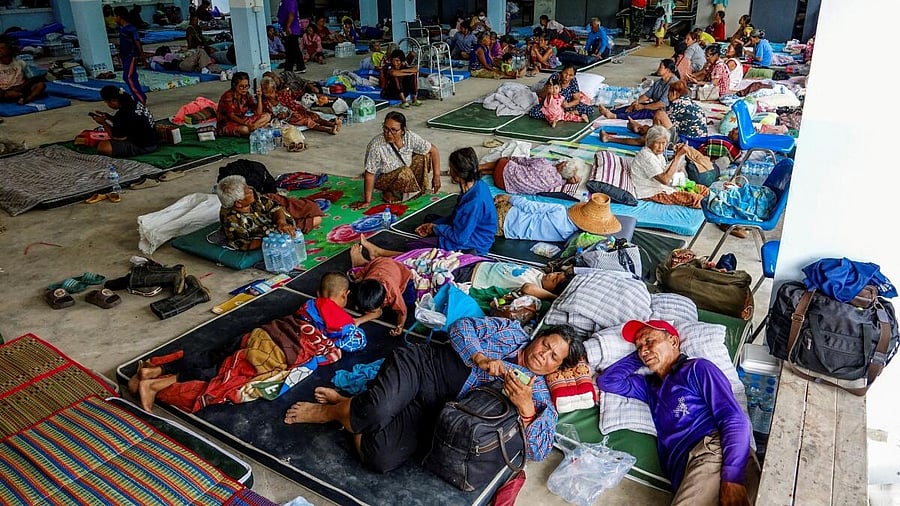
People rest at a shelter, following recent clashes along the disputed border between the two countries, according to authorities people have been killed across three border provinces, in Surin province, Thailand.
Credit: Reuters Photo
Bangkok: A months-long standoff between Cambodia and Thailand turned into a deadly exchange of fire along their contested border Thursday that killed at least 11 civilians and a soldier, according to Thai officials.
Both nations accused the other of striking first, in the worst hostilities between the Southeast Asian neighbors in more than a decade.
The Thai army said Cambodia had fired rockets into civilian areas in four Thai provinces, prompting Thailand to send F-16 fighter jets to strike targets in Cambodia and order the evacuation of border areas. The clashes killed at least 11 Thai civilians and one soldier, and injured 24 civilians and seven soldiers, Thailand’s Ministry of Public Health said.
Cambodian officials, who did not immediately confirm reports of casualties, said Thai soldiers had opened fire on Cambodian troops first, at Prasat Ta Muen Thom, a temple claimed by both nations. It said Cambodian forces returned fire some 15 minutes later. People in Samraong, a Cambodian district near the border, said they were still hearing gunfire hours after the clashes began.
The tensions began in late May after the death of a Cambodian soldier in a border skirmish between troops from both sides. The dispute escalated Wednesday when a Thai soldier lost his leg in a land mine explosion at the border.
Thailand’s prime minister, Paetongtarn Shinawatra, who has been suspended from office amid the crisis but remains leader of the country’s governing party, condemned what she called Cambodian aggression. She said on social media that Cambodian forces had “initiated the use of arms and fired into Thai territory — impacting both officials and innocent civilians.”
Prime Minister Hun Manet of Cambodia said in a statement that his nation had “no choice but to respond with armed force against this armed invasion.”
Here’s what else to know:
— Last major clash: In 2011, a week of fighting in territory disputed between the two nations killed at least 15 people, including civilians, and displaced tens of thousands of people.
—Disputed territory: The border between the countries in Surin, the province in northeastern Thailand that is at the center the fighting, has been contested for years. Surin is known for being home to ruins from the Khmer Empire, which flourished from around the 9th to roughly the 13th century. These include Prasat Ta Muen Thom, a temple on the Thai side of the border whose ownership is disputed by the countries, and where gunfire erupted Thursday.
—Thailand’s political crisis: The tensions with Cambodia had already led to Paetongtarn’s suspension from office and protests calling for her resignation. Last month, Hun Sen, a powerful former Cambodian prime minister who is the father of the country’s current leader, leaked a recording of a private phone call he had with Paetongtarn in which she referred to him deferentially as “uncle” and made disparaging remarks about the Thai military.
—China’s role: The fighting between Thailand and Cambodia presents a potential diplomatic opening for Beijing, which has increased its economic and political influence in both countries at a time when governments in Southeast Asia are becoming increasingly wary of the United States. A spokesperson for China’s Foreign Ministry, Guo Jiakun, said Thursday that Beijing was “deeply concerned” by the skirmishes and that Beijing had been working to facilitate talks between the two sides.